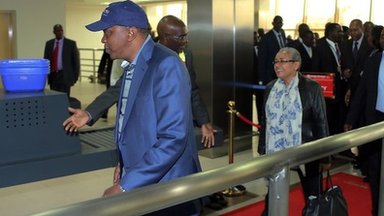Kenyan President Uhuru Kenyatta has arrived in The Hague ahead of an appearance at the International Criminal Court (ICC) on charges of crimes against humanity on Wednesday.
He will be the first serving head of state to ever come before the court.
The charges concern his role in violence that followed the 2007 elections, in which more than 1,000 Kenyans were killed.
He denies the charges and believes that the case should be thrown out.
The ICC has summoned him to explain allegations that evidence against him had been withheld by the Kenyan government – a claim rejected by Kenyan Attorney-General Githu Muigai who appeared before the court on Tuesday.
In September, the court postponed the trial after prosecutors said the Kenyan government had failed to deliver key documents.
Witnesses for the prosecution have withdrawn from the case.
Personal capacity
Deputy President William Ruto will be acting president while Mr Kenyatta is at The Hague.
On Monday, the president again stressed his innocence, saying his conscience was clear.
In a speech to the Kenyan parliament, Mr Kenyatta said that he was going to The Hague in a personal capacity – not as president of the country – so as not to compromise the sovereignty of Kenyans.
No special arrangements have been made at the ICC. The main spokesperson for the court said that Mr Kenyatta would not be treated differently from any other accused person.


Esther Waweru from Kenya’s Human Rights Commission welcomed his arrival.
“The fact that the president is actually going to appear before the International Criminal Court tomorrow for this status conference is an indication that clearly the president does recognise that there is need for victims to actually get justice before the court,” she said.
Former chief prosecutor for the ICC, Luis Moreno Ocampo, conceded that the trial “was not working well” but welcomed Mr Kenyatta’s scheduled appearance as “showing African commitment to change”.
Mr Kenyatta was elected in 2013, despite facing charges. Analysts said he turned the prosecution to his advantage, portraying it as foreign intervention in Kenya’s domestic affairs.
Mr Kenyatta faces five charges relating to the ethnic massacres – the worst violence in Kenya since independence in 1963. Tens of thousands of people were displaced and Kenya’s reputation for stability was tarnished.
Mr Kenyatta was a close ally of President Mwai Kibaki, who was declared the winner of the 2007 election. Mr Kibaki’s rival, Raila Odinga, claimed the poll was marred by fraud.
The dispute took on an ethnic dimension, pitting members of the Kikuyu ethnic group of Mr Kenyatta and Mr Kibaki against other communities. Mr Kenyatta is accused of organising an ethnic Kikuyu gang, the Mungiki sect, to attack rival groups.
Vice-President Ruto also faces charges at The Hague, but he was on Mr Odinga’s side during the violence. He also denies the charges.



